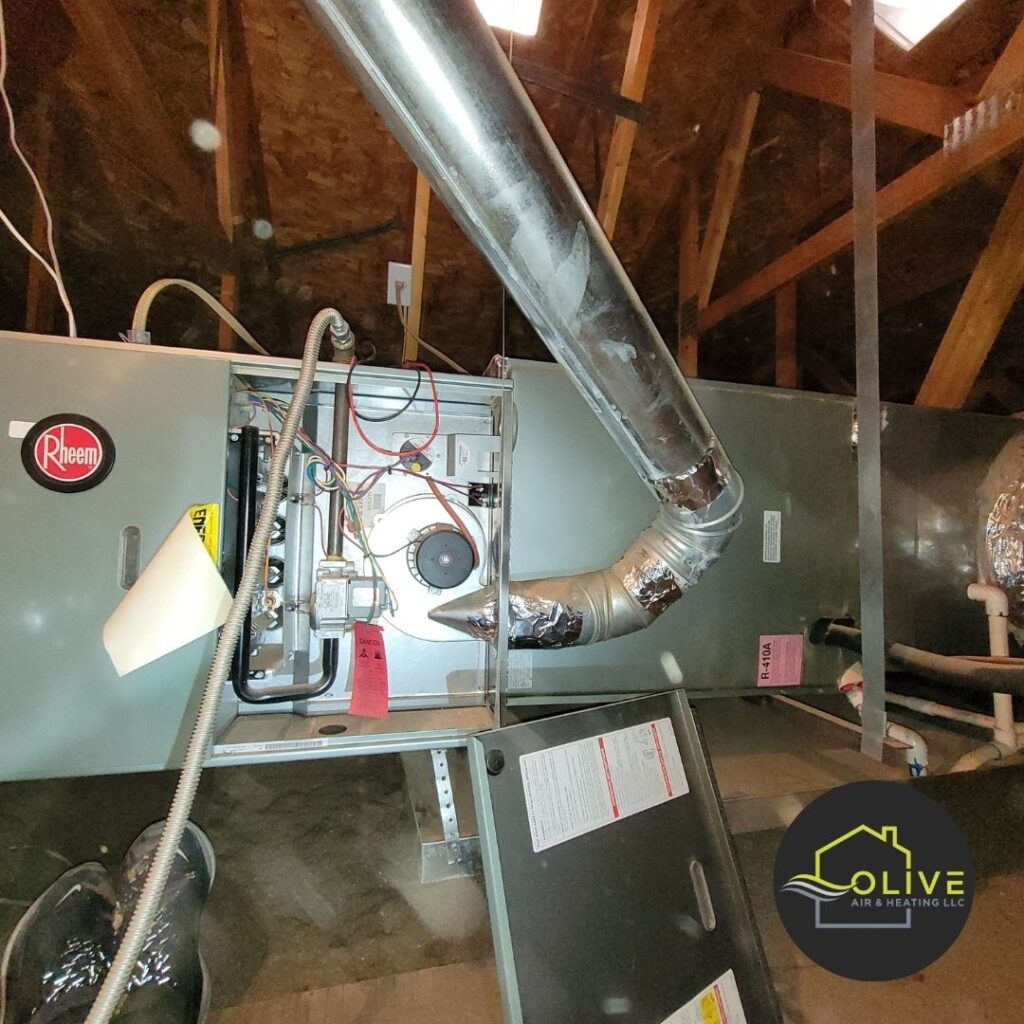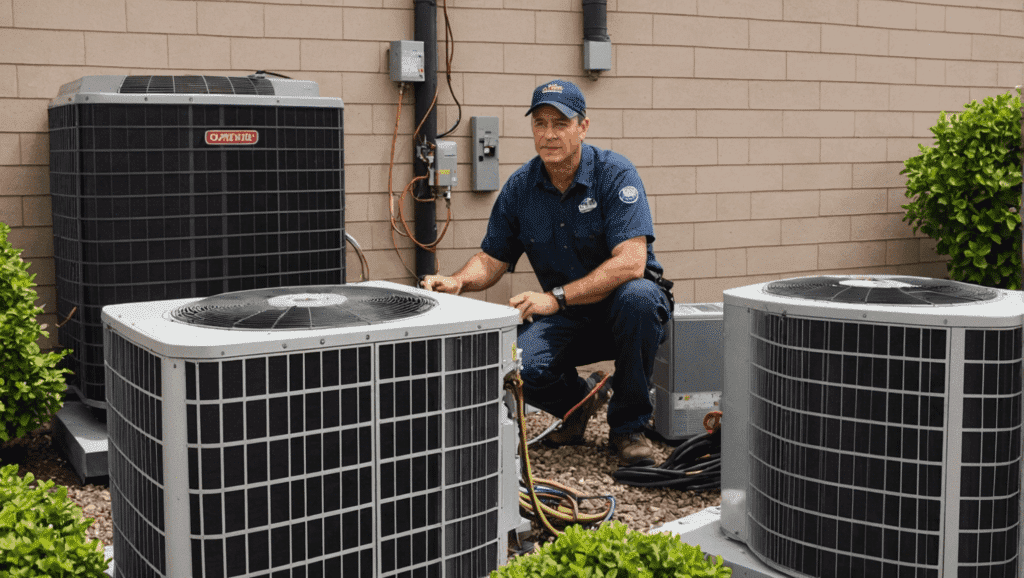Ever heard someone say, “Your air conditioner should just run forever without needing any care”? Or maybe you’ve been told that most AC problems are easy, do-it-yourself fixes? If so, you’re not alone. These are just a couple of the biggest myths floating around about AC repair.
At Olive Air and Heating, we see this all the time—homeowners waiting until their system is on its last leg, assuming repairs are unnecessary or that a quick fix will do the trick. But here’s the truth: believing these myths can cost you money, comfort, and even your entire AC system.
So, let’s get real and debunk the top five myths about AC repair that could save you time, money, and a lot of headaches.

Myth #1: “AC Repair is Only Necessary When the System Stops Working”
Reality Check: Waiting until your AC completely breaks down is like waiting until your car won’t start to think about maintenance. By then, it’s often too late—and way more expensive.
AC repair isn’t just about fixing major breakdowns. In fact, most repair jobs could have been avoided with regular AC maintenance or a simple AC tune-up. Think of it this way: your air conditioner is a complex machine, and like any machine, it wears down over time. Regular air conditioning maintenance helps catch small issues before they turn into big, costly problems.
Signs Your AC Might Need Help—Before It Breaks Down:
- Increased Energy Bills: If your bills are climbing without an increase in usage, your AC is likely working harder than it should.
- Strange Sounds: Unusual noises like banging, rattling, or hissing can indicate loose parts or wear.
- Weak Airflow: If the airflow feels weak or inconsistent, there might be a clog or another issue.
Ignoring these signs can lead to a full-blown AC repair emergency—usually at the worst possible time. Pro tip: Schedule regular AC tune-ups to catch problems early and avoid unexpected downtime.
For more on how often you should schedule maintenance, check out this guide: How Often Should You Schedule AC Repair?
Myth #2: “It’s Always Cheaper to Repair Than to Replace”
Reality Check: This myth costs homeowners thousands every year. While repairs might seem cheaper upfront, constantly fixing an old system can add up—fast.
If your AC repair costs are more than half the price of a new unit, you’re probably wasting money. Newer systems are more energy-efficient, meaning they cost less to run and can save you money on monthly energy bills. Plus, if your unit is over 10–15 years old and constantly breaking down, it might be time to consider a new AC installation.
When AC Repair Might Not Be Worth It:
- Frequent Repairs: Needing repairs every year (or more) is a red flag.
- Rising Energy Bills: An older unit working overtime isn’t saving you money.
- Reduced Cooling Efficiency: If your home isn’t cooling evenly, your AC’s best days might be behind it.
Pro tip: If your repair costs are piling up, investing in a new system could save you money in the long run. Learn more about when to repair vs. replace in this article: 30 Things You Didn’t Know About AC Repair (But Should)
Myth #3: “Any HVAC Contractor Can Handle AC Repair”
Reality Check: Not all HVAC contractors are created equal. Just because a company offers HVAC services doesn’t mean they specialize in AC repair.
At Olive Air and Heating, we focus specifically on air conditioning repair and AC maintenance because AC systems are our expertise. Choosing a dedicated team ensures you get experienced, efficient service without the risk of rookie mistakes.
Tips for Choosing the Right AC Repair Service:
- Check Experience: Look for companies with years of AC repair experience.
- Read Reviews: Testimonials from other customers can reveal a lot about the quality of their work.
- Ask About Warranties: A good AC repair company will stand by their work with a warranty on parts and labor.
Pro tip: Always choose a specialized AC repair expert. For reliable service, visit our AC Repair Service page.

Myth #4: “All AC Repairs Cost a Fortune”
Reality Check: Not every AC repair is a budget-buster. In fact, many minor issues—like clogged filters or low refrigerant levels—can be fixed quickly and affordably.
However, ignoring these small problems can lead to major, expensive repairs down the line. That’s why regular AC maintenance is so important. It keeps your system running efficiently and prevents costly breakdowns.
Examples of Cost-Effective Repairs:
- Air Filter Replacements: Dirty filters make your AC work harder, costing you more in energy bills.
- Thermostat Calibration: A poorly calibrated thermostat can make your AC run longer than necessary.
- Regular Tune-Ups: Scheduled air conditioning tune-ups keep your system running smoothly and extend its lifespan.
Pro tip: Don’t assume all AC repair jobs are expensive. Small fixes, when caught early, are typically much more affordable. For more tips, check out this guide: Essential Air Conditioning Maintenance for Arizona’s Hot Climate
Myth #5: “AC Repair Can Wait Until Summer”
Reality Check: Waiting until it’s hot to fix your AC is a big mistake. Summer is peak season for AC repair, which means higher prices, longer wait times, and uncomfortable heat while you wait.
The truth is, AC maintenance and AC tune-ups are ideally done before the summer months. This prepares your system to handle the season’s demands and ensures you’re not caught off guard by a breakdown.
Best Times for AC Maintenance:
- Spring: Schedule your air conditioning tune-up during the cooler months when you’re not relying heavily on the system.
- Fall: After a long summer, getting your AC serviced can prepare it for next year’s demands.
Pro tip: Don’t wait until your AC is overloaded to schedule a tune-up. A little preventative maintenance can save you from mid-summer headaches. For more on preparing your system, visit: How to Prep for AC Repair and Minimize Disruption at Home

The Hidden Costs of Delaying AC Repair: What You Should Know
Ignoring small issues with your AC can lead to big problems—and even bigger bills. According to Zero Hedge, delaying AC repair can result in:
- Higher Energy Bills: A struggling system works harder, consuming more energy.
- Premature System Failure: Small issues can snowball into major breakdowns, requiring costly replacements.
- Reduced Comfort: A malfunctioning AC can leave you sweating through the summer.
The bottom line? Don’t wait until it’s too late. Regular AC maintenance and timely repairs can save you money and keep your home comfortable year-round.
Conclusion: Don’t Fall for These AC Repair Myths
Myths about AC repair can be costly and uncomfortable to believe. By understanding what’s true and what’s not, you can keep your AC system in top shape, save money, and avoid breakdowns when you need cool air the most.
If you’re in Gilbert, AZ, and need reliable AC repair, AC maintenance, or a new AC installation, Olive Air and Heating has you covered. Call us at (480) 405-0798 or visit us at Olive Air and Heating to schedule your next service.
Ready to Take Action?
- Learn more about our services: AC Maintenance
- Have questions? Contact Us today!
Stay cool, stay efficient—and let us take care of the rest!


